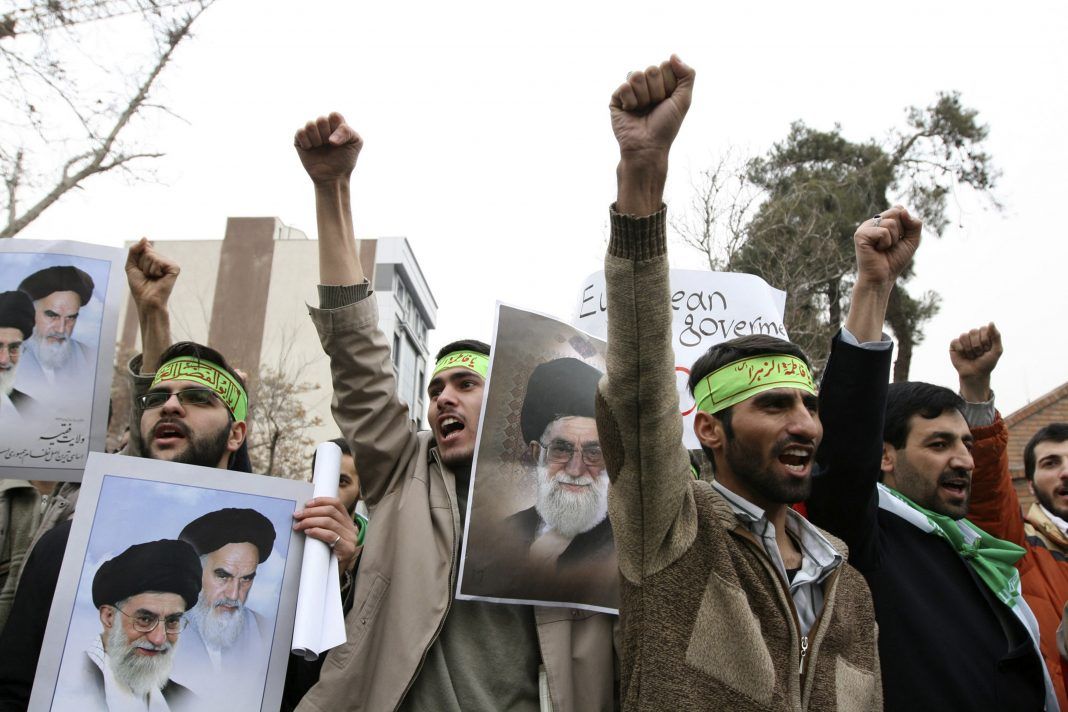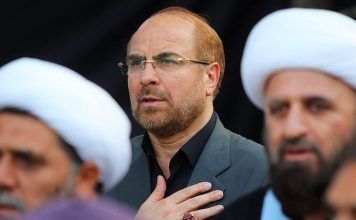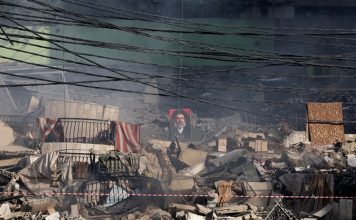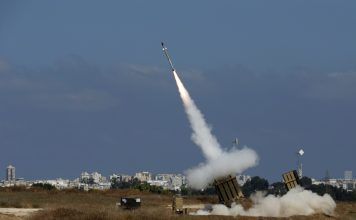The former head of the Supreme Court of Iran, the late Ayatollah Seyyed Mohammad Hossein Beheshti (1928-1981), delivered a speech at Tehran University on Oct. 26, 1979, in which he said: “Iranians must tighten their belts for the next few years to ensure the survival of the revolution,” adding that “the Islamic Revolution Council urges everyone to reduce consumption.”
Dr. Beheshti was one of the key architects of the Iranian Constitution and held various senior posts in post-revolutionary Iran, including chair of the Islamic Revolution Council and deputy secretary of the Assembly of Experts. He was killed when a bomb exploded at an Islamic Republic Party conference in Tehran on June 28, 1981.
In 1979 the Islamic Revolution promised to usher in a new era of hope, prosperity, and justice. Instead, it has bankrupted the country, destroyed its economy, and pushed a large segment of the population into poverty in the past 41 years.
“Unprecedented and crippling economic sanctions grip the country,” Iran’s First Vice President Eshagh Jahangiri was quoted by the Islamic Republic News Agency (IRNA) as saying on Sept. 20. “To overcome these trying times, the government’s priority should be to boost the nation’s political, social, and economic resilience.”
In comments reported by the Iranian Students News Agency (ISNA) on Aug. 7, 2019, the deputy commander of the Law Enforcement Force of the Islamic Republic of Iran (NAJA), Brigadier General Ayoub Soleimani, said: “While NAJA cannot solve the country’s economic problems, it can ease the pressure, restore calm and defend the nation against the enemy.”
“U.S. officials have concluded that they would lose if they were to go to war with Iran,” General Soleimani added.
Speaking at a gathering in Mashhad, the capital of the northeastern province of Khorasan Razavi on Dec. 26, the deputy commander of the Islamic Revolutionary Guards Corps (IRGC) for cultural affairs, Brigadier General Hossein Nejat, said: “In the past 40 years, the West has adopted a new tactic to undermine our governing system.”
“The new Western model relies on social movements and uses the disadvantaged, the marginalized, an illiterate segment of society who have been manipulated on the internet,” General Nejat was quoted by the Tehran-based Aftab news agency as saying.
[aesop_image img=”https://kayhanlife.com/wp-content/uploads/2020/07/2009-06-13T000000Z_1571981362_GM1E56D1MTL02_RTRMADP_3_IRAN-ELECTION-CLASH-scaled.jpg” panorama=”off” credit=”Iranians protest in front of the police in Tehran. REUTERS./FILE PHOTO” align=”center” lightbox=”off” captionsrc=”custom” captionposition=”center” revealfx=”off” overlay_revealfx=”off”]
It appears that after four decades of mismanaging the country, the regime’s top priorities have been reduced to “boosting national resilience” and “fending off the enemy.”
The Majlis (Iranian Parliament) Research Center released a report in June that said 70 percent of the 40 million households within the Iranian labor force lived under the poverty line.
It is abundantly clear that the regime’s “resistant economy,” aimed to circumvent sanctions, has been ineffective against the U.S.’s “maximum pressure” campaign. The widespread discontent has spread through every walks of life in Iran, including in the armed forces. Senior military officials fear a revolt among the rank and file.
Although the UN arms embargo on Iran, which prevented it from buying weapons, expired on Oct. 18, it is doubtful that any country will rush to sell Iran tanks, fighter jets, and other military arsenals. Also, the Islamic Republic is cash poor and unable to fund its proxy wars and regional military activities.
Many senior state officials and influential figures are worried about the widespread discontent among the military officers and personnel.
During a meeting with the commander of NAJA, Brigadier General Hossein Ashtari on Oct. 20, Grand Ayatollah Naser Makarem-Shirazi, a Shia source of emulation (Marja), said the police and security forces must protect the Islamic Republic regime, the Tehran-based Khabar Online News Agency reported.
“NAJA must remove the poison that is spreading through the internet,” Ayatollah Makarem-Shirazi told General Ashtari. “Protecting the system is an act of religious devotion. NAJA plays a crucial role in safeguarding the Islamic Republic’s governing system. You must highlight this duty to the forces under your command.”
Article 154 of the Islamic Republic Constitution (English text) states: “The Islamic Republic of Iran has, as its ideal human felicity throughout human society, and considers the attainment of independence, freedom, and rule of justice and truth to be the right of all people of the world. While scrupulously refraining from all forms of interference in the internal affairs of other nations, it supports the just struggles of the Mostazafan (oppressed) against the Mostakbaran (oppressors) in every corner of the globe.”
After 40 years of theocratic rule, the regime has called on the armed forces to consider safeguarding the Islamic Republic as an act of “worship.” It expects the military to protect the oppressive Islamic Republic regime and crush the oppressed Iranian people who have been taking part in the ongoing nationwide protests since October 2019 when the government raised fuel prices.
The reelection of U.S. President Donald Trump would realize the worst fears of the regime’s two principal factions, fighting over whether to open talks with Washington. The current U.S. administration has consistently said that it would continue to pressure Iran as long as the regime refuses to curb its nuclear ambitions, ballistic missile program, and regional activities.
Even Iran’s powerful allies, including China and Russia, cannot rescue it from the political and economic quagmire of its own making.
Iran’s Supreme Leader Ayatollah Ali Khamenei has always opposed direct talks with the U.S.
During a remote video address to the officer schools of the Islamic Republic of Iran’s Armed Forces on Oct. 12, Khamenei lambasted the U.S. for its hostile policy towards Iran.
“Some people speak of a sensible approach, which reveals their fear, apathy, and desire to flee the enemy. Being scared and running away are exact opposites of rational thinking,” Khamenei was quoted by the Tasnim news agency as saying. “Cowards may not speak about a sensible approach. Rational thinking means making calculated decisions. However, the enemy promotes a perverted version of a rational approach. Some people here repeat the enemy’s rhetoric, unwittingly.”
Some senior Iranian officials believe that to de-escalate the current crisis, a senior military figure should take over the executive branch.
Reformists such as Mahmoud Sadeghi, a former Majlis deputy who represented Tehran, Rey, Shemiranat, and Eslamshahr electoral district, have openly welcomed any candidate serving in the military to stand in the 2021 presidential election.
In an interview with the Tehran-based Arman-e Meli newspaper on Oct. 19, Mr. Sadeghi said: “A person in the military has the same rights as others to be a candidate. We should deprive no one of standing in elections because of their military service. Many military figures are committed to civil society more than those who claim to champion it.”
In comments reported by the Iranian Labor News Agency (ILNA) on Oct. 21, Dariush Ghanbari, a reformist political activist, said: “A low voter turnout would pave the way for the election of a military figure in the presidential race.”
In an interview with the Etemad newspaper in April 2018, Saeed Hajjarian, a reformist political strategist, predicted that the next government, following the 2021 election, would comprise either entirely military officers or a mixture of members of the military and clergy.
Conservatives and Islamists have been promoting the election of someone with a military background as the next president. It is abundantly clear that the top state officials in Iran hope that a government comprising the former and current military officers would ensure the Islamic Republic regime’s survival. It could also signal a significant shift in the regime’s overall strategy, meaning transferring the clerical power to the IRGC.
Any military or ideological system has to own up to its actions, eventually. Such regimes either continue their oppressive tactic to ensure their survival or face popular uprising, eventually ending their despotic rule.
It would not shock or surprise anyone if the Islamic Republic’s theocratic regime hides behind the IRGC. The Iranian security forces and intelligence agencies must have reported to Supreme Leader, Ayatollah Khamenei, on the ongoing nationwide protests, widespread anger, and discontent among the public.
By now, Mr. Khamenei must know that no amount of oppression can stop Iranians from all walks of life from expressing their distrust and dislike of the government and the regime itself.
What Tehran fears the most is the unrelenting U.S. efforts to cripple the Iranian economy and curb the regime’s regional activities through its “maximum pressure” campaign. The regime hopes that if elected president, Joe Biden may roll out a less hostile Iran policy. It also recognizes that it has to negotiate with any future U.S. administration to avoid further unrest and challenges to its rule.
This article was translated and adapted from Persian by Fardine Hamidi.








